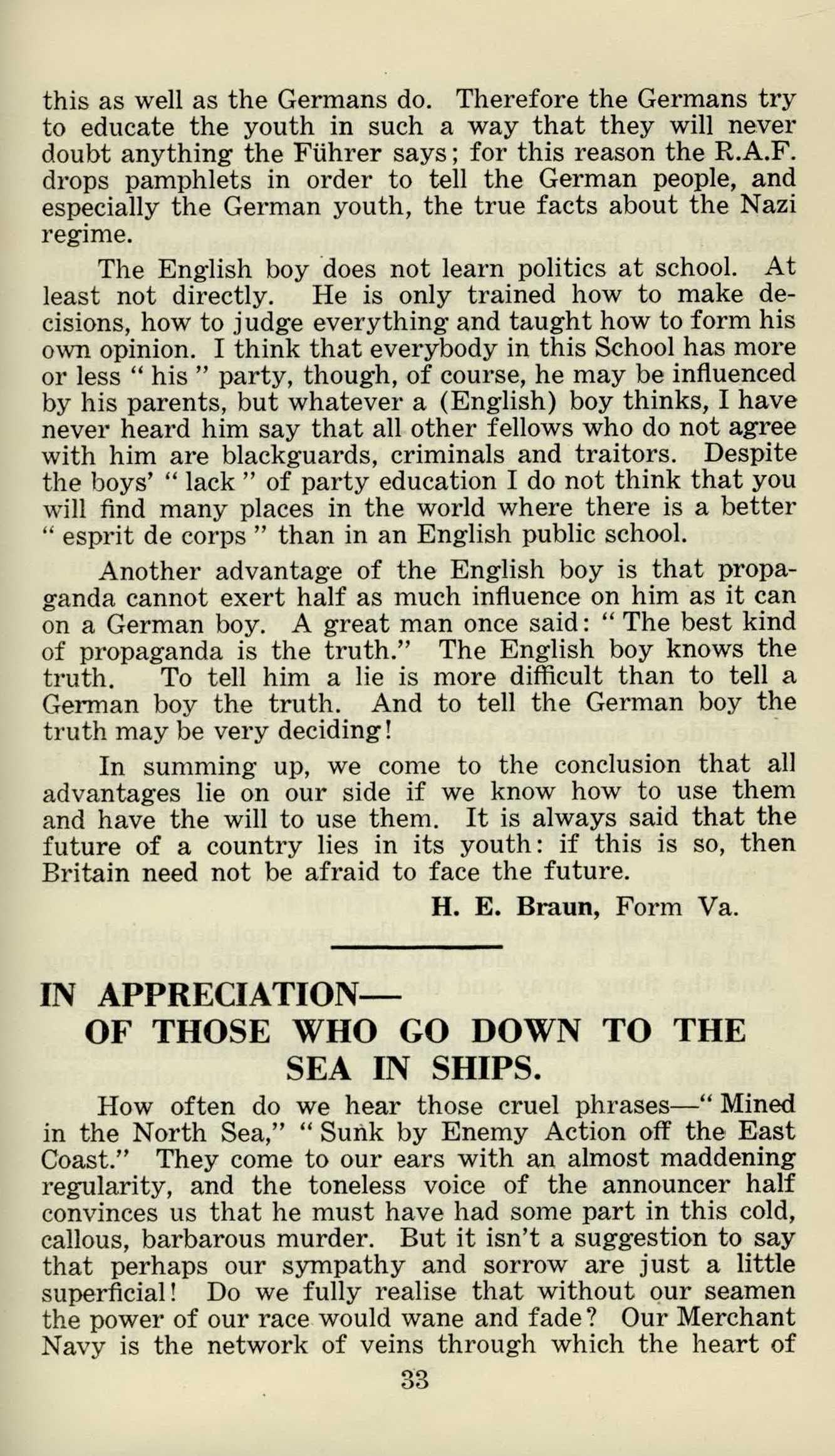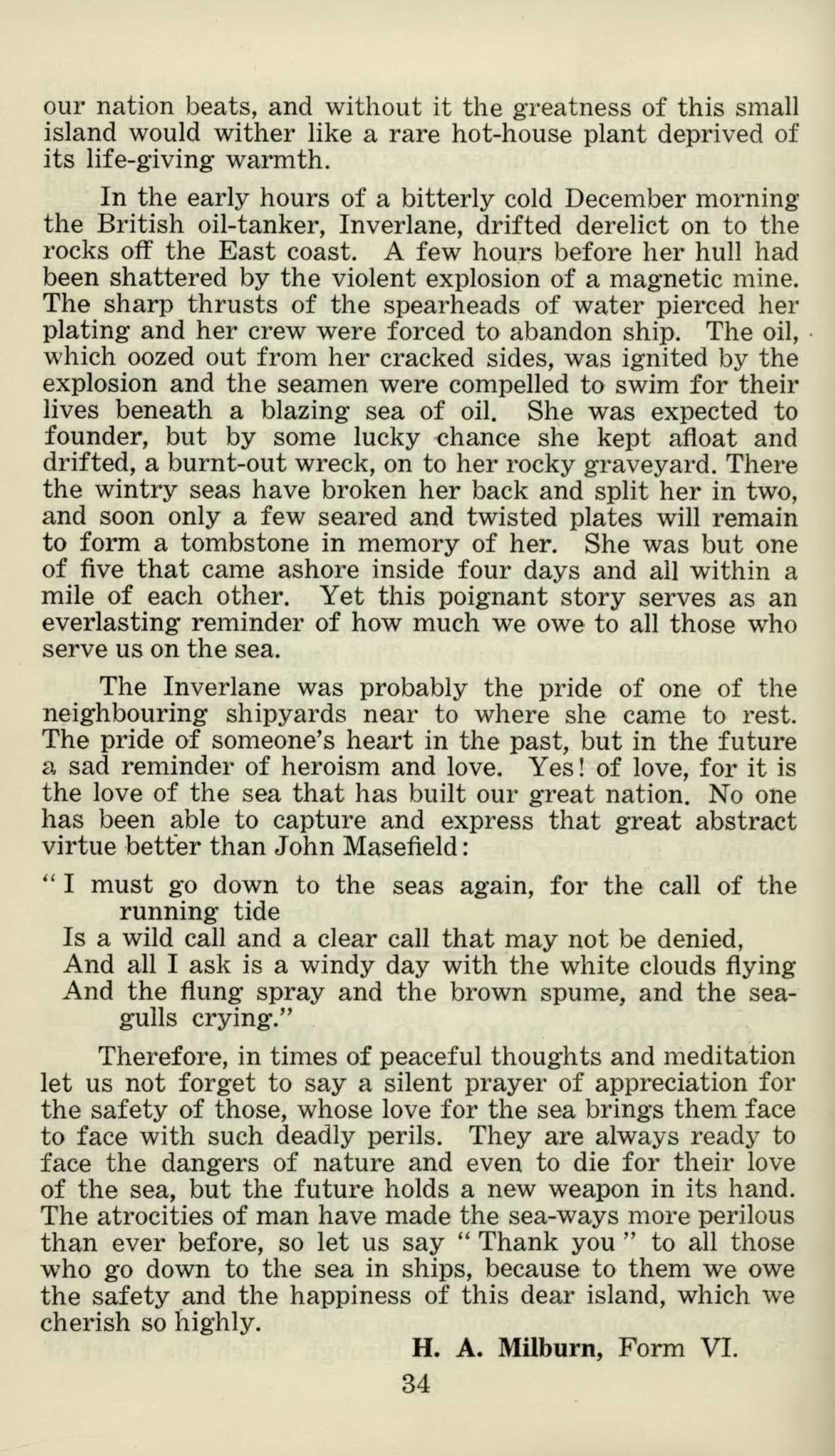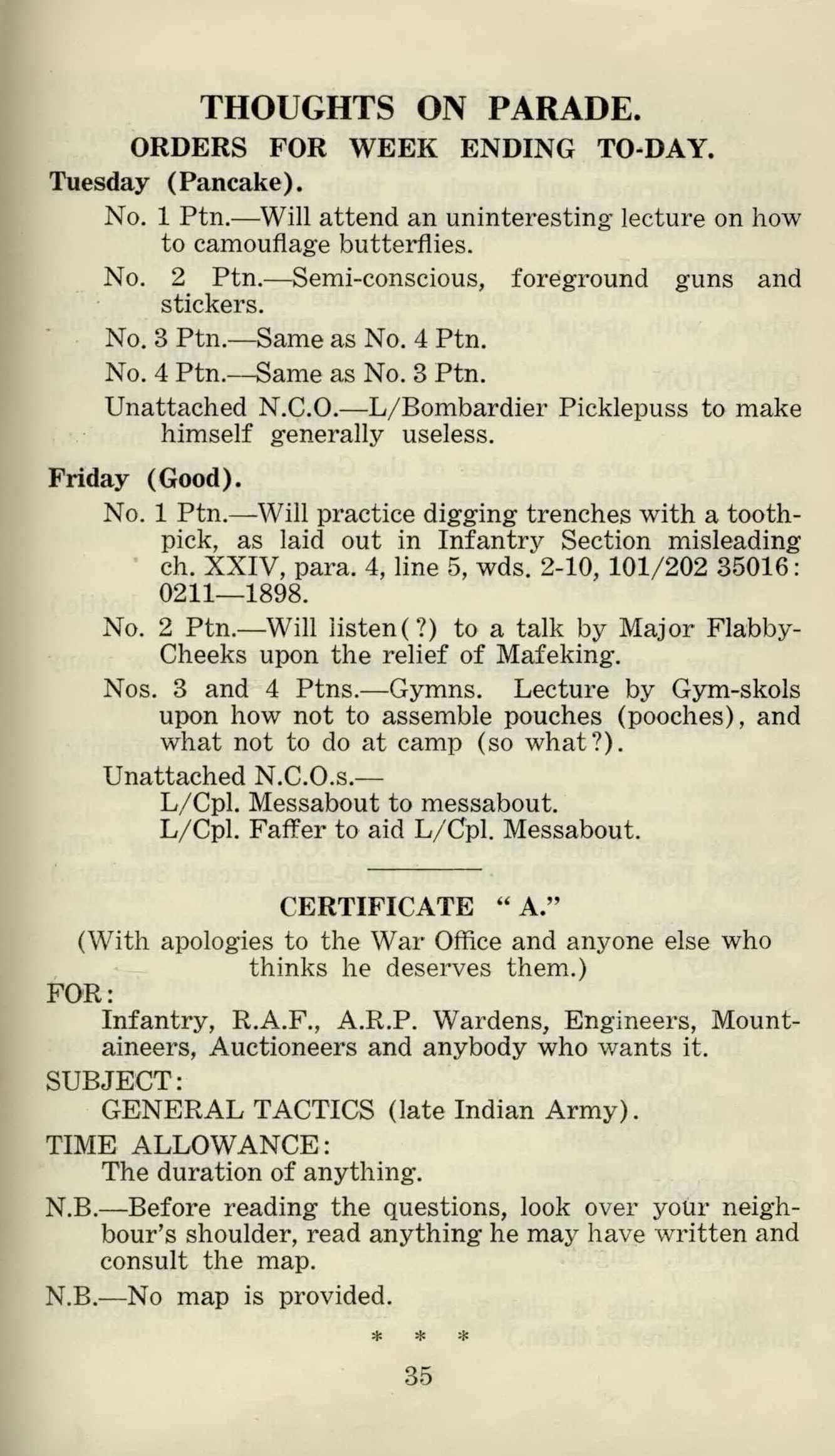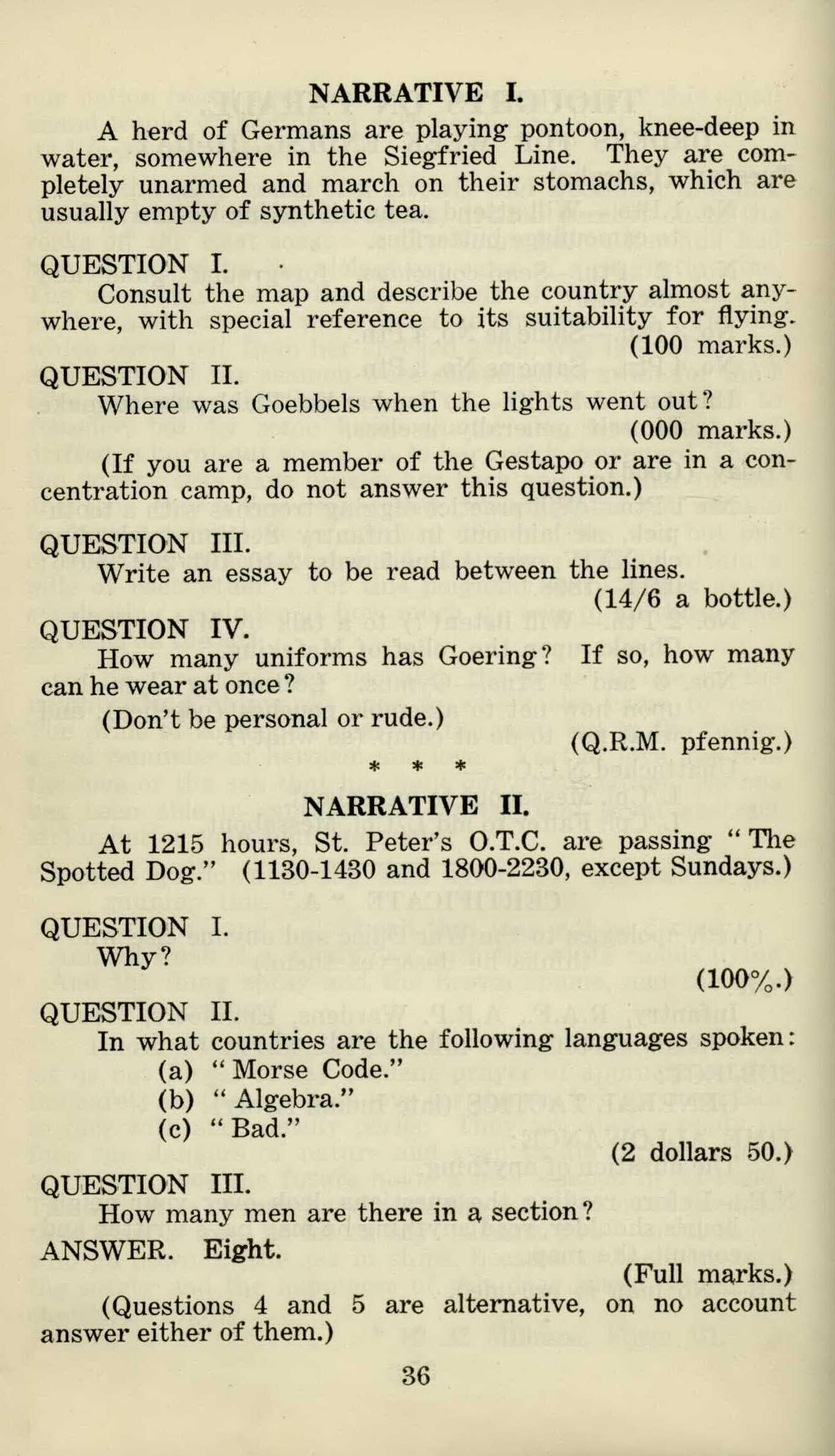
6 minute read
in Ships
from April 1940
by StPetersYork
this as well as the Germans do. Therefore the Germans try to educate the youth in such a way that they will never doubt anything the Ftihrer says ; for this reason the R.A.F. drops pamphlets in order to tell the German people, and especially the German youth, the true facts about the Nazi regime.
The English boy does not learn politics at school. At least not directly. He is only trained how to make decisions, how to judge everything and taught how to form his own opinion. I think that everybody in this School has more or less " his " party, though, of course, he may be influenced by his parents, but whatever a (English) boy thinks, I have never heard him say that all other fellows who do not agree with him are blackguards, criminals and traitors. Despite the boys' " lack " of party education I do not think that you will find many places in the world where there is a better " esprit de corps " than in an English public school.
Another advantage of the English boy is that propaganda cannot exert half as much influence on him as it can on a German boy. A great man once said : " The best kind of propaganda is the truth." The English boy knows the truth. To tell him a lie is more difficult than to tell a German boy the truth. And to tell the German boy the truth may be very deciding!
In summing up, we come to the conclusion that all advantages lie on our side if we know how to use them and have the will to use them. It is always said that the future of a country lies in its youth : if this is so, then Britain need not be afraid to face the future. H. E. Braun, Form Va.
IN APPRECIATION-
OF THOSE WHO GO DOWN TO THE SEA IN SHIPS.
How often do we hear those cruel phrases—" Mined in the North Sea," " Sunk by Enemy Action off the East Coast." They come to our ears with an almost maddening regularity, and the toneless voice of the announcer half convinces us that he must have had some part in this cold, callous, barbarous murder. But it isn't a suggestion to say that perhaps our sympathy and sorrow are just a little superficial! Do we fully realise that without our seamen the power of our race would wane and fade ? Our Merchant Navy is the network of veins through which the heart of 33
our nation beats, and without it the greatness of this small island would wither like a rare hot-house plant deprived of its life-giving warmth.
In the early hours of a bitterly cold December morning the British oil-tanker, Inverlane, drifted derelict on to the rocks off the East coast. A few hours before her hull had been shattered by the violent explosion of a magnetic mine. The sharp thrusts of the spearheads of water pierced her plating and her crew were forced to abandon ship. The oil, • which oozed out from her cracked sides, was ignited by the explosion and the seamen were compelled to swim for their lives beneath a blazing sea of oil. She was expected to founder, but by some lucky chance she kept afloat and drifted, a burnt-out wreck, on to her rocky graveyard. There the wintry seas have broken her back and split her in two, and soon only a few seared and twisted plates will remain to form a tombstone in memory of her. She was but one of five that came ashore inside four days and all within a mile of each other. Yet this poignant story serves as an everlasting reminder of how much we owe to all those who serve us on the sea.
The Inverlane was probably the pride of one of the neighbouring shipyards near to where she came to rest. The pride of someone's heart in the past, but in the future a sad reminder of heroism and love. Yes! of love, for it is the love of the sea that has built our great nation. No one has been able to capture and express that great abstract virtue better than John Masefield: " I must go down to the seas again, for the call of the running tide
Is a wild call and a clear call that may not be denied,
And all I ask is a windy day with the white clouds flying
And the flung spray and the brown spume, and the sea- gulls crying."
Therefore, in times of peaceful thoughts and meditation let us not forget to say a silent prayer of appreciation for the safety of those, whose love for the sea brings them face to face with such deadly perils. They are always ready to face the dangers of nature and even to die for their love of the sea, but the future holds a new weapon in its hand. The atrocities of man have made the sea-ways more perilous than ever before, so let us say " Thank you " to all those who go down to the sea in ships, because to them we owe the safety and the happiness of this dear island, which we cherish so highly.

H. A. Milburn, Form VI. 34
THOUGHTS ON PARADE.
ORDERS FOR WEEK ENDING TO-DAY. Tuesday (Pancake).
No. 1 Ptn.—Will attend an uninteresting lecture on how to camouflage butterflies.
No. 2 Ptn.—Semi-conscious, foreground guns and stickers.
No. 3 Ptn.—Same as No. 4 Ptn.
No. 4 Ptn.—Same as No. 3 Ptn.
Unattached N.C.O.—L/Bombardier Picklepuss to make himself generally useless.
Friday (Good).
No. 1 Ptn.—Will practice digging trenches with a toothpick, as laid out in Infantry Section misleading ch. XXIV, para. 4, line 5, wds. 2-10, 101/202 35016:
0211-1898.
No. 2 Ptn.—Will listen ( ?) to a talk by Major FlabbyCheeks upon the relief of Mafeking.
Nos. 3 and 4 Ptns.—Gymns. Lecture by Gym-skols upon how not to assemble pouches (pooches), and what not to do at camp (so what ?).
Unattached N.C.O.s.— L/Cpl. Messabout to messabout. L/Cpl. Faffer to aid L/Cpl. Messabout.

CERTIFICATE " A." (With apologies to the War Office and anyone else who thinks he deserves them.)
FOR:
Infantry, R.A.F., A.R.P. Wardens, Engineers, Mountaineers, Auctioneers and anybody who wants it. SUBJECT :
GENERAL TACTICS (late Indian Army). TIME ALLOWANCE :
The duration of anything. N.B.—Before reading the questions, look over your neighbour's shoulder, read anything he may have written and consult the map. N.B.—No map is provided. * * *
NARRATIVE I.
A herd of Germans are playing pontoon, knee-deep in water, somewhere in the Siegfried Line. They are completely unarmed and march on their stomachs, which are usually empty of synthetic tea.
QUESTION I.
Consult the map and describe the country almost anywhere, with special reference to its suitability for flying. (100 marks.)
QUESTION II.
Where was Goebbels when the lights went out ? (000 marks.) (If you are a member of the Gestapo or are in a concentration camp, do not answer this question.)
QUESTION III.
Write an essay to be read between the lines. (14/6 a bottle.)
QUESTION IV.
How many uniforms has Goering? If so, how many can he wear at once? (Don't be personal or rude.) * * * (Q.R.M. pfennig.) NARRATIVE II.
At 1215 hours, St. Peter's O.T.C. are passing " The Spotted Dog." (1130-1430 and 1800-2230, except Sundays.)

QUESTION I. Why? (100%.)
QUESTION
In what (a) (b) (c) II. countries are the following languages spoken: " Morse Code." " Algebra." " Bad."
(2 dollars 50.)
QUESTION III.
How many men are there in a section? ANSWER. Eight.
(Full (Questions 4 and 5 are alternative, on no answer either of them.) marks.) account










